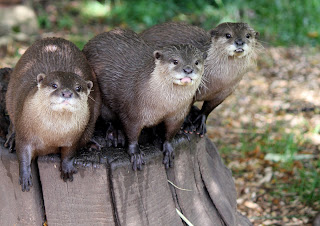"Don't hedge your prose with little timidities. Good writing is lean and confident...Every little qualifier whittles away some fraction of the reader's trust. Readers want a writer who believes in himself and in what he is saying. Don't diminish that belief. Don't be kind of bold. Be bold."--William Zinsser
Sucking leeches.
Weasel words.
Wishy-washy.
Weakling.
Flabby. Ooh, fightin' words, yes?
Not when it comes to the writer's world.
While such terms would be insults when speaking about a person, they characterize an important writing principle when applied to
qualifiers, those words that "limit or modify the meaning of another word, changing how absolute, certain or generalized it is" (
source).
William Strunk of
Elements of Style fame makes the point vividly clear: "Avoid the use of qualifiers.
Rather,
very,
little,
pretty--these are the
leeches that infest the pond of prose,
sucking the blood of words. The constant use of the adjective
little (except to indicate size) is particularly debilitating..."
Judy Delton, in
The Most Common Writing Mistakes (And How to Avoid Them) explains: "A qualifier is something that takes a perfectly clear, decisive statement and weakens it. It is a
wishy-washy word that
drains strong statements of their validity. Qualifiers are words like
just,
even,
like,
although,
also,
besides,
almost,
maybe,
if,
but,
too,
unless,
sort of....These
weaklings qualify things so that a writer or speaker never has to take a stand, never has to make a decision. He can eat his cake and have it too, pleasing both sides. A new writer who is afraid of risks (anyway) finds them convenient and satisfying (sort of)."
Again, this time from the
Writing Center, "Qualifiers and intensifiers are words or phrases that are added to another to modify its meaning, either by limiting it ('he was somewhat busy") or by enhancing it ("the dog was very cute")...Excessive use of qualifiers can make you sound unsure of your facts...writing that contains too many qualifiers can sound unclear and wordy."
Bryan Garner, author of
Garner's Modern American Usage, calls the qualifying word "very" a
weasel word..."(it) functions as both an adjective and an adverb, surfaces repeatedly in
flabby writing. In almost every context in which it appears, its omission would result in at most a negligible loss. And in many contexts the idea would be more powerfully expressed without it."
I find the term "weasel word" particularly descriptive. Turns out it's not new to a writer's vocabulary. According to
Wikipedia, the expression derives from the egg-eating habits of weasels. "An egg that a weasel has sucked will look intact to the casual observer, while actually being empty. Similarly, words or claims that turn out to be empty upon analysis are known as 'weasel words.' The expression first appeared in Stewart Chaplin's short story 'Stained Glass Political Platform' (
The Century Magazine, 1900), in which they were referred to as 'words that suck the life out of the words next to them, just as weasel sucks the egg and leaves the shell." (More on weasel words
here.)
It took me some time to understand how qualifiers negatively affect the impact of writing. But with edits, I've identified my worst culprits:
seems,
just,
about,
almost,
all.
Ever done a "find" search to see how many qualifiers
* you use? If you're like me, you're tired of the wishy-washy, weak words, and don't want your characters to be that way either. I'm all for pulling out those suckers, wrestling the weasels down, and shooting for more vibrant, powerful language. How about you?
*The most common qualifiers according to About.com: very, quite, rather, somewhat, more, most, less, least, too, so, just, enough, indeed, still, almost, fairly, really, pretty, even, a bit, a little, a (whole) lot, a good deal, a great deal, kind of, sort of.
(photo: sxc.hu)
___________________





